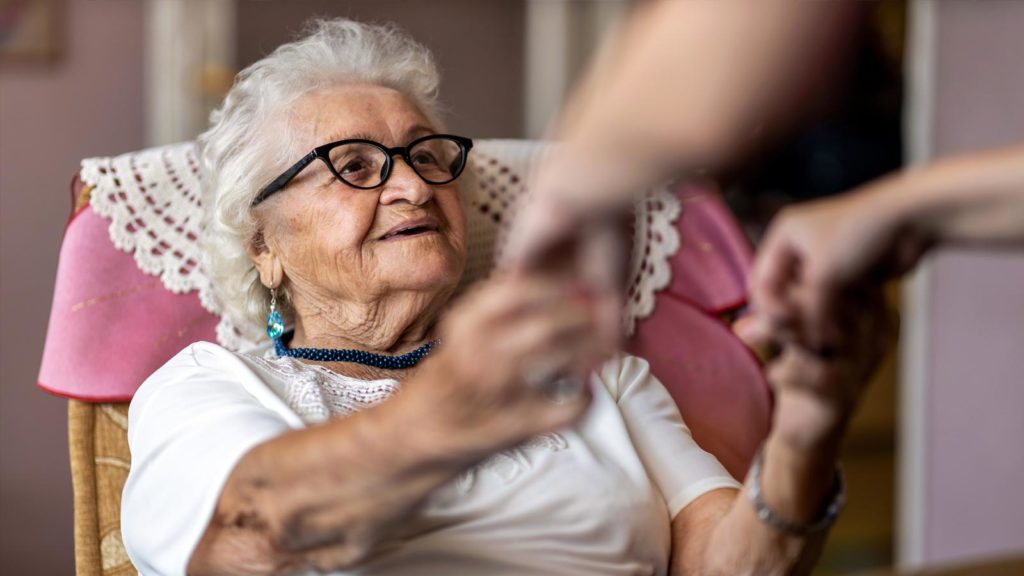Project Overview
The UKRI funded Edinburgh University led Healthier Working Lives programme assesses the challenges and opportunities for the over 50’s care workforce. Our ambitions are to identify ways to promote healthier working lives and ageing for older care workers – developing their careers, enhancing user continuity and promoting everyone’s wellbeing.
Key dimensions of the care sector are in crisis, and it has never been more crucial to encourage professional, respected and confident workers along with workforce planning and support. Critically, from its inception the programme aims to transform aspects of the care sector though co-production with care workers. This will stimulate intrapreneurship to generate innovative products and services that have impact at scale. It is our ambition that the legacy of the programme will be sustained well beyond the lifetime of this work. Healthier Working Lives for the Care Workforce runs for three years from March 2021 to March 2024, and Edinburgh University is partnering with Codebase, Creative Venue, Legal and General, Reading University and Scottish Care.
The care sector challenge
The Healthier Working Lives for the Care Workforce programme team are acting to tackle a crisis facing care workers and organisations – low-paid, insecure employment and tiring physical and emotional conditions. This is reflected in unusually high levels of workforce turnover and vacancy rates. Care is a mixed economy sector, and many service provider owners and managers are struggling to maintain care quality levels with limited resources and increasing costs.
Add to this, the challenge that the over 50’s frontline care workforce is experiencing their own ageing, whilst addressing the stresses of caring in work and caring for their families and elders. A critical situation made worse by the pandemic.
At its heart the programme will engage care workers, care service providers leaders, solution providers and stakeholder groups to accelerate innovation and develop scaleable and spreadable solutions that make careers in the care profession attractive and aspirational.
Engagement with older people
The Healthier Working Lives for the Care Workforce programme will tackle head on the need for significant practical change in the sector at the sharp end of service delivery. The primary goal is to generate and support ideas, co-design and adoption of innovative products and services that address challenges in the recruitment, retention and enhancement of the health and well-being of older workers particularly in the growing residential and retirement village care sectors.
Innovative solutions. The products and services may be initiatives, tools, processes or resources, that will require technical, design and financial support to be attractive, relevant, user-friendly and popular. The solutions will be developed through co-design and co-production that ensures care workers and providers inform, shape and guide the proposition development process.
Knowledge network. The programme will also nurture a community of innovators and intrapreneurs in the care sector through creativity, empathy, lifelong learning and peer support amongst care workers and care providers. A richer and more diverse community of practice is an important legacy that will enable the sector to accelerate change as demand increases.
Working with business
Addressing care demand pressure and supply crisis
This Healthier Working Lives for the Care Workforce programme will address a perfect storm of sustained and increasing demand coupled with a volatile supply side struggling to deliver.
Demand. One in 12 people in the UK are over 75 and by 2040, this will rise to one in seven.
- A third of children born now are expected to live to 100.
- On average, people aged 65 will live just half of the rest of their life without disability.
- The UK care home population is 450,000 and growing.
Supply. The care sector is worth circa £15.9 b to the UK economy
- Over 5,500 providers managing 16,000 UK care homes, employ 650,000 people
- 82% of workers are women, with 21% of BAME origin
- 27% of workers are aged 55+ with many of this age group working in supervisory roles.
Recruitment and retention. There are currently an estimated 120,000 vacancies many filled by agency workers
- The annual turnover of staff is around 30% – 430,000 left in the last 12 months
- 25% of 16–25-year-olds are expecting to pursue a career in the sector in the near future
This presents a challenge to the wellbeing of staff, residents, families, and communities. Continuity in staffing, recognition of the value of their work, and supporting workers to co-determine their development needs, are central to this programme.
Showcasing care Trailblazers
The care sector is on the cusp of significant change and the programme aims to discover and listen to the experiences of ‘Care Trailblazers’ leading that change, breaking new ground and disrupting the market. This will enable the programme team to identify market failures and gaps, key development themes and opportunities and areas of focus for future programme and industry development.
Diversity and environments of ageing
Co-designing with users
The co-design process places our key audience at the heart of our work. The care workers themselves and the ideas that have about their industry will inform, shape and guide the proposition development process. They will be deeply involved in a collaborative process with innovators and entrepreneurs in the care and healthy ageing sectors.
Leading industry partners
The programme is funded through UKRI’s Healthy Ageing Challenge and led by Edinburgh University partnering with Codebase, Creative Venue, Legal and General, Reading University and Scottish Care.
- Universities of Edinburgh and Reading are hosting the programme with team members highly experienced in ageing, workforce, inequalities and care and research methods. Experts have been recruited including a programme manager, co-design lead and research lead.
- Codebase – the UK’s largest technology incubator, offering mentorship for the deployment of ideas.
- Creative Venue (John Mathers, ex-CEO of the British Design Council, and Julian Grice) have advised with the Healthy Ageing challenge and deliver design growth training and development to the Community of Practice with the Centre for Ageing Better.
- Legal & General is one of the UK’s leading providers of retirement villages.
- Scottish Care represents 400 organisations in the private, not for profit and charities sector of residential care.
Project Team Members
The project will be lead by Professor Linda McKie, and will be supported by Professor Sophie Bowlby, Dr Stella Chan, Stephen Coleman OBE, Caroline Deane, Julian Grice, Professor Sarah Kettley, Dr Sue Lewis, John Mathers, Dilesh Shah, Dr Luis Soares, and Bettina Zenz.










